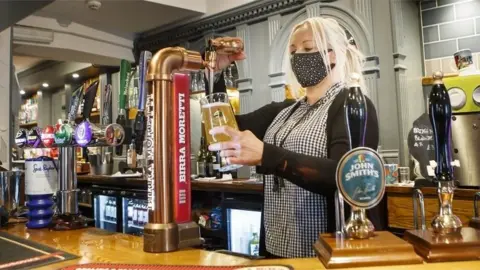Covid-19: Businesses 'throwing in towel' over uncertainty
 PA Media
PA MediaMany businesses are "simply throwing in the towel" because of worries over government support during the next few months, Labour has said.
Shadow chancellor Anneliese Dodds argued Boris Johnson's Covid recovery "roadmap" had not brought "certainty".
She told BBC Radio 4's Today programme that furlough, the business rates holiday and the VAT cut had to be extended in next week's Budget.
Chancellor Rishi Sunak said he would do "everything" possible to protect jobs.
Official figures show the UK economy shrank by 9.9% last year - more than twice the biggest previously recorded annual fall.
Announcing the strategy for removing England's Covid restrictions on Monday, the prime minister said non-essential shops, hairdressers, gyms, outdoor hospitality and self-contained holiday accommodation could reopen on 12 April.
From 17 May, two households or a group of six may be able to meet indoors in a pub, cafe or restaurant, with cinemas, museums, hotels, and performance and sport venues reopening.
Remaining sectors, including nightclubs, could restart on 21 June, Mr Johnson said.
But Ms Dodds told Today the timetable, which is subject to conditions on keeping down the spread of coronavirus, had come "without clarity for business support".
She added: "Businesses have been put through an enormous amount of uncertainty. They should now know that the business rates holiday will continue, that the VAT reduction for hospitality business will continue."
The chancellor promised to use next Wednesday's Budget to lay out the "support we'll provide through the remainder of the pandemic and our recovery", adding: "I know how incredibly tough the past year has been for everyone, and every job lost is a personal tragedy."

'The daffodils are out, but visitors aren't'
 Lorna and Alistair Handyside
Lorna and Alistair HandysideLorna Handyside, who runs Higher Wiscombe holiday cottages in Southleigh, Devon, with her husband Alistair, called the current situation "completely devastating".
"We still have the overheads. We still have loans. We still have to keep the cottages warm, so they don't get damp or damaged," she said.
"The daffodils are coming out. The bulbs are coming out. Normally we have lots of people here going for walks and enjoying being in the countryside, and they can't."
Mr Handyside, who is also chairman of the Professional Association of Self-Caterers, said: "We've got the cliff-edge at the end of March. VAT rises from 5% to 20%, furloughing ends and business rates start being payable in April. And yet half the businesses won't be trading.
"So in the Budget next week, we would fully anticipate that the chancellor would have to support the hospitality sector across those three measures."
Closed gyms 'cost £500,000 a day'
Humphrey Cobbold, the CEO of Puregym, said reaction had been "bittersweet" to the news that gyms can reopen in April, rather than March.
He said the delay of 48 days from now until 12 April will cost Puregym £29m, around £500,000 a day. This is because there are still fixed costs for rent and utilities facing all hospitality businesses.
Gyms and hospitality need to find their way out of "very difficult" situations before bills, such as rent arrears, become even larger, he told the BBC News Channel.
He said some landlords had been understanding, but many more had not been prepared to share the burden of the pandemic.
By the end of March, he said, gyms will have been closed for eight months. He added it was "essential that this is the last lockdown".

Under current government measures, the VAT rate for hospitality and tourism has been cut from 20% to 5% until 31 March.
The business rates holiday for leisure, hospitality and retail firms is due to end at the same time.
These schemes should go on, with furlough - due to finish at the end of April - continuing in a "more effective" form, Ms Dodds said.
"The prospect of not having clarity means that many of those businesses and their owners are simply throwing in the towel," she added.
"And we cannot afford that in the UK when we've already had record redundancies."
'Incredibly tough'
The latest official figures show the unemployment rate rose to 5.1% in the three months to December, the highest since autumn 2015.
The Office for National Statistics said there were "tentative early signs" of the labour market easing, though there were "still over 700,000 fewer people employed than before the start of the coronavirus pandemic".
The devolved nations have the power to set their own restrictions.
In Wales, First Minister Mark Drakeford has said he hopes some non-essential shops and hairdressers could reopen within three weeks.
In Scotland, First Minister Nicola Sturgeon will outline details of her plan to reduce restrictions later on Tuesday.
Northern Ireland's health minister has played down the prospect of restrictions being eased by Easter, with a review of current measures taking place on 18 March.
